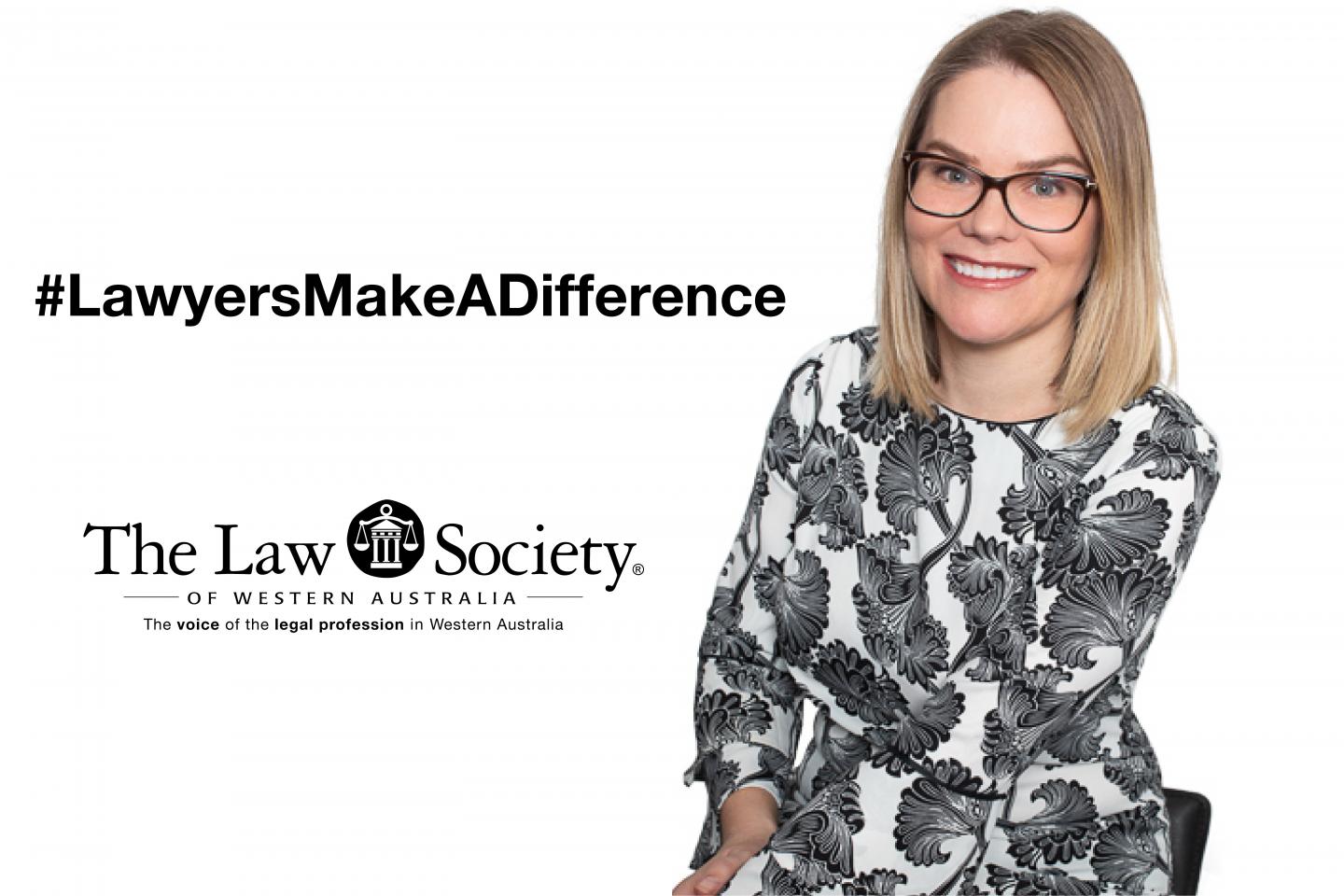

In Law Week 2019, the Law Society of Western Australia launches a new, ongoing campaign, #LawyersMakeADifference, to highlight real stories of lawyers using their skills to help people in our community. In this article, Rebecca Bunney, Head of Practice – Family Law at Cullen Macleod Lawyers, shares her story.
When I was about 25, I decided to become a lawyer so that I could help people. I was a mature aged student, with no background, family or friends in the law. In fact I had worked in hospitality for around 5 years. But by doing that I had met all kinds of people, from all different backgrounds, nationalities and cultures, and I realised that I really like people.
I studied a psychology degree first, but realised that helping people via psychology can take a long time, and only worked if the person was motivated to change. This meant that I was not in control of the outcome, and as a Type A person I needed to have a measurable way to prove to myself that I was doing my job well. Law appealed to me as a more structured way to be able to solve problems and provide an outcome for people.
After finishing my law degree in 2007, I first worked in commercial litigation, banking and finance in a large corporate firm before I moved to a smaller firm in Nedlands, where I eventually chose to specialise in family law. The attraction to family law for me is that I can provide immediate assistance to people, in areas that make a large difference to their lives.
Family law is the perfect marriage between psychology and the law. Family law advice has to be technically correct but it also has to be delivered in a particularly sensitive way, in language that the client can understand, and taking into account what is often a highly emotional situation. In many cases, I am the first lawyer that that my clients have ever met, which can be overwhelming for them, and makes it more difficult for them to retain the information and advice that I give them. I have to make sure that they understand what I tell them, as while the family law was created for everyday people, it is complex and involves concepts that most people have never heard of until they are sitting in the office of a family lawyer or in the Family Court.
Trust is an integral part of my role, it is necessary for my client to have trust in me, so I have to build rapport and my client needs to feel heard and understood. This doesn’t mean that family lawyers are “counsellors” to their clients, but our role does require a lot of listening, and yes, almost every client cries at some point in the first meeting. I have always been comfortable with emotions, so some tears, or some anger, does not interfere with the way that I relate to my clients or how I can provide advice.
Family law is action-packed, and apart from the criminal lawyers, we appear in Court more than any other area of law. We are involved in urgent applications: for money so that my clients can support themselves and their children, or to have children returned to their care. We are constantly negotiating with the other party (or their solicitor) to reach agreements about what the next steps will be, or before a final agreement can be reached. As the wait to receive a Court date can take many months, and it can take years to reach a Trial, it is imperative that family lawyers are excellent negotiators. Our ability to reach an agreement with the other side is often the only way our clients can progress their case (including care arrangements for their children, and/or separating their property and finances in a property settlement). We have to be proactive, creative, and realistic about what our clients can achieve.
Family lawyers are like “traffic directors” in that every client almost always needs advice or assistance from some other professional in order for them to have all the information they require in order to make good choices in their family law matter. We routinely refer our clients to financial planners, psychologists, taxation specialists, accountants, addiction specialists, and many others. Part of our job is to identify what other assistance our client needs, as usually our clients do not know. Our experience tells us what our clients need, and our relationship with the client means that they trust our judgment and recommendations.
I am lucky enough that my employers allow me to take on as many pro bono clients as I can manage within the practice. My favourite people to act for are grandparents, as I find that a grandparent will only become involved in the proceedings if it is absolutely necessary to ensure that the children are well-cared for. With a grandparent, there is unlikely to be the “tit for tat” that can occur when parents are in dispute over the care arrangements for their children. Unfortunately, the rise of methamphetamine use has meant that there are a lot of children with meth-addicted parents, and the grandparents are having to step up to take care of them. This situation is unlikely to change for a while, so I anticipate that many more pro bono applications from grandparents will come across the door of Law Access, and out to the profession.
Family law can be stressful, and sometimes it is difficult to leave the work at work. More people than I can remember have asked me how I can work in this area, and whether I am constantly sad about the stories I hear? After a while, you learn to have the necessary distance to be an effective lawyer. You need to be objective, and to have a safe distance from your clients. If you are upset by what upsets them, then you are unable to give them the objective advice they need. However, we are not robots, so there are still one or two cases per year that affect me. When that happens, I rely on good support from my colleagues in the office to debrief, identify what has triggered the reaction, and learn from it.
Ultimately after 12 years, I am lucky enough to be doing what I set out to do at law school – help people, and I get to meet and work with interesting people who I genuinely like, so can say for so many reasons, I really enjoy being a family lawyer.
To find out more, watch the #LawyersMakeADifference campaign video and follow the Law Society's social media channels: Facebook, Linkedin and Twitter.






